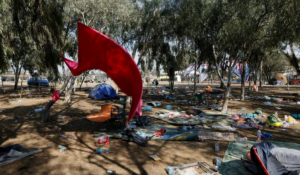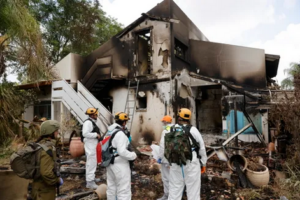Israel blocks UN probe into Hamas October 7 sexual crimes to avoid abuse of Palestinians inquiry

The aftermath of the Nova music festival in southern Israel following the October 7 attack
Liza Rozovsky reports in Haaretz on 8 January 2025:
Israel is blocking the United Nations from investigating sexual crimes committed by Hamas during its October 7 attack, fearing it would require granting access to probe allegations of sexual violence against Palestinians in Israeli detention.
A thorough investigation could have led to Hamas being added to the UN’s blacklist of entities suspected of sexual violence in conflicts.
Pramila Patten, the UN’s Special Representative of the Secretary-General on Sexual Violence in Conflict, has requested permission to investigate Hamas’ alleged crimes. However, she stipulated that her team must also be allowed to access Israeli detention facilities to examine claims of sexual violence by Israeli soldiers. Israel has refused the request.
Patten has urged Israel to sign a framework agreement with her office, committing to measures against sexual violence in conflicts under UN guidance. Similar agreement have been signed with Ukraine in 2022, which included commitments to protect prisoners of war from sexual violence.
Patten’s March report, based on a visit to Israel last year, documented sexual violence during Hamas’ attack and alleged continued assaults on hostages held in Gaza. These findings were included in UN Secretary-General Antonio Guterres’ annual report to the Security Council on sexual violence in conflict. However, Guterres did not add Hamas to the UN’s blacklist of entities likely responsible for sexual crimes, prompting criticism in Israel.
Patten’s office confirmed it is exploring the possibility of a future mission to the region. “The Office is exploring a future mission to the region after receiving an invitation from the Palestinian Authority regarding reports of conflict-related sexual violence against Palestinians as well as outreach by the Government of Israel for a follow-up visit on the 7 October attacks and their aftermath.”
However, Patten’s office warned that Israel’s resistance to UN investigations into alleged crimes attributed to it could backfire, according to representatives of the Israel’s Women’s Network, who met with Patten’s team in New York last month. They further said they were told that Israel’s approach could result in its inclusion on the UN’s blacklist of entities responsible for sexual violence in conflicts, while Hamas could remain off the list. Another source familiar with the matter confirmed these details.
Maya Schocken, head of the International Department at the Israel’s Women’s Network (and a relative of Haaretz’s publisher, full disclosure), said: “The clear concern is that Israel could be added to the blacklist of states and entities responsible for sexual violence in conflict, while the terrorist organization Hamas stays off the list.”
Prof. Ruth Halperin-Kaddari, head of Bar-Ilan University’s Rackman Center, which aims to improve the legal status of women in Israel, helped bring Patten to Israel previously and continues to push for her return. She emphasized the importance of Patten’s work, noting that her report was the first major international acknowledgment of Hamas’ sexual crimes.

The ruins of a house in Kibbutz Be’eri following the October 7 attack
The two previously held senior positions on the UN Committee on the Elimination of Discrimination Against Women, and Prof. Halperin-Kaddari underscores Patten’s seriousness and integrity.
She notes that a year after the previous investigation, with new information emerging about the events of October 7 and the abuse of captives in Gaza, failing to allow a comprehensive investigation by Patten represents “a missed opportunity for a definitive international record and recognition for the victims – not to mention the obligation to thoroughly investigate the new evidence to uncover the truth.”
She adds that cooperating with Patten offers Israel an opportunity to show UN bodies that it is sincerely investigating the allegations against itself, which could also reduce the risk of Israel being added to the blacklist of entities suspected of sexual violence in conflicts.
Following Patten’s March report, women’s rights organizations in Israel, including the Israel’s Women’s Network and Hadassah, an American Jewish volunteer women’s organization, have pressed UN officials to include Hamas on the blacklist. In response, Patten wrote that many armed groups took part in the October 7 attack and in order to attribute sexual violence to a specific group requires time and greater access for investigation.
In the same letter, Patten also referenced her recommendation to the Israeli government, which appeared in the original report she published, to grant UN bodies with investigative mandates access to perform their work. Among the bodies she mentioned was the Independent Commission of Inquiry on the Occupied Palestinian Territory, including East Jerusalem, and Israel – an organization often viewed in Jerusalem as holding a biased, anti-Israel stance. Patten emphasized in her letter that the commission is committed to independence and impartiality.
In the summer, the commission published a report on the October 7 attack, which included direct responsibility for gender-based violence in “several locations in southern Israel” attributed to “Hamas members and other armed groups.”
The commission noted in the report that it had not received direct access to testimonies and evidence that could have strengthened and expanded its conclusions, and that the Israeli government had even restricted its access.
Israel’s lack of cooperation with international figures investigating violence is one of the key failures highlighted in a report released this week by the Israel’s Women’s Network and the Women and War Documentation and Research Collective, a group of researchers and activists collected and cataloged information about the sexual violence that occurred on October 7 and in its aftermath.
The report, authored by Dr. Sarai Aharoni and Shira Barbirai-Shaham, focuses on failures both before and after October 7. It critiques the non-implementation of government and UN resolutions related to the security of women in conflict and emergency situations, and the failure to establish a state body with the authority to document and address the consequences of sexual violence in the Hamas attack.
The report also highlights how the issue of sexual violence has been appropriated for public relations purposes, often neglecting the needs of the victims. Additionally, the report addresses the lack of public involvement in truth-finding processes and accountability for the sexual violence of October 7. The authors stress: “It was both possible and necessary for information regarding the status of evidence collection and a projected timeline for filing indictments and prosecution to be released a year after the attack.”
Aharoni pointed out that the fact that both the state and civil society are relying on UN bodies for truth-finding reveals the extent of the authorities’ failure. “Where does the UN write reports? In Haiti, Sudan. Countries with functioning legal systems – do the work, conduct investigations, hold trials,” she told Haaretz.
However, the need for an independent investigation does not negate the necessity of cooperating with international bodies. Patten’s office typically guides countries on how to handle and investigate sexual crimes, while also demanding independent access for such investigations.
Patten’s office encourages countries to sign cooperation frameworks for this purpose. Schocken notes, “The cooperation between Ukraine and the UN has provided survivors of violence with support, resources, and global recognition. We, on the other hand, are losing out in every direction.”
In response, Patten’s office stated: “The Office is exploring a future mission to the region … If such a mission were to be conducted, it would be strictly in accordance with the Office’s mandate from the Security Council and will not be ‘investigative’ in nature.”
The Israeli Foreign Ministry responded, stating that the ministry “is working to coordinate the visit of Pramila Patten to Israel with her team and all relevant Israeli authorities. The International Organizations Department at the Foreign Ministry and the Israeli Mission to the UN are in constant communication with Pramila Patten and her team in order to bring to the international community’s attention the crimes committed by Hamas, including the horrific sexual crimes that occurred on October 7 and continue to be perpetrated since.
“The Foreign Ministry initiated Patten’s first visit to Israel in cooperation with civil society and places great importance on her efforts regarding Hamas’ sexual crimes.”
This article is reproduced in its entirety
